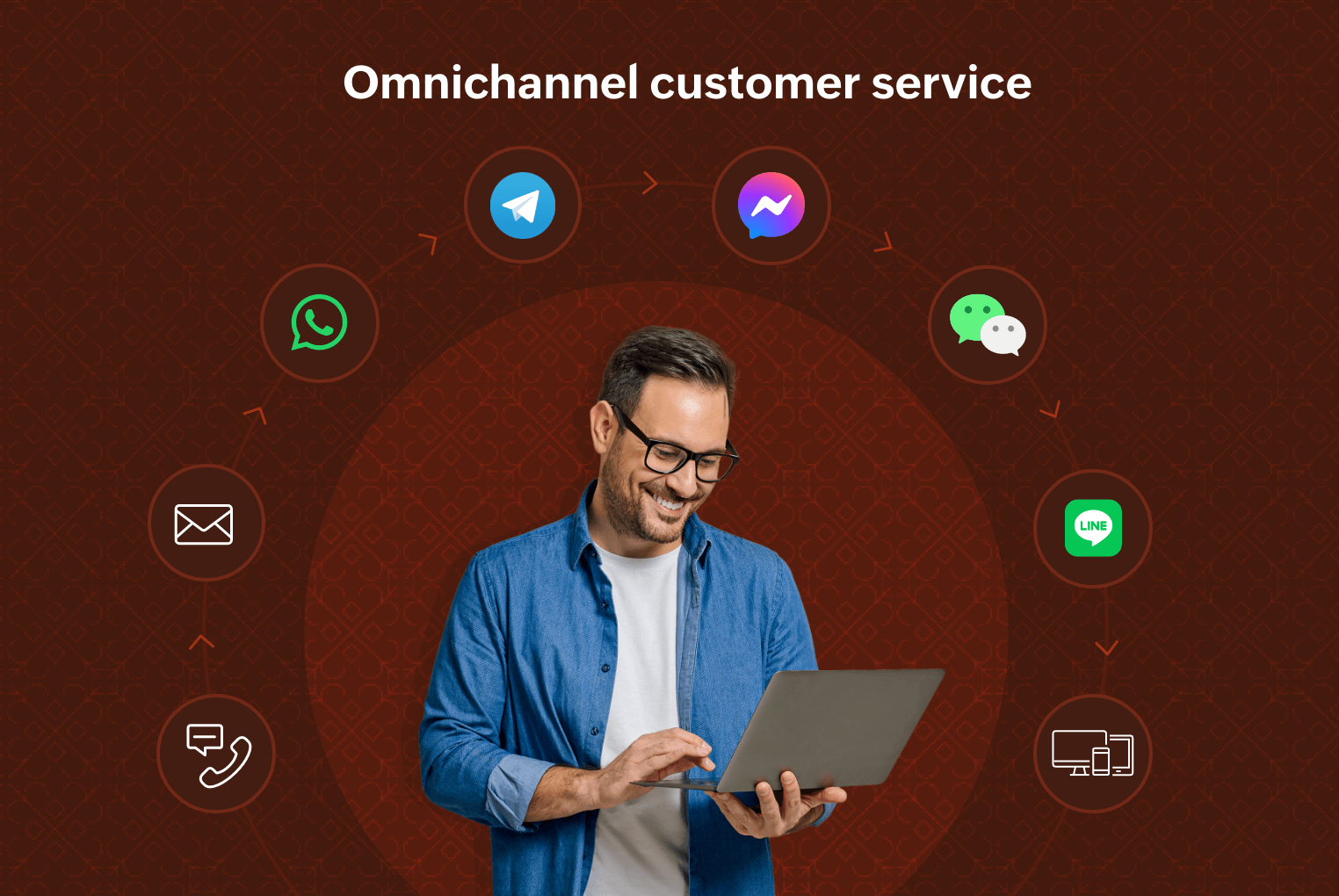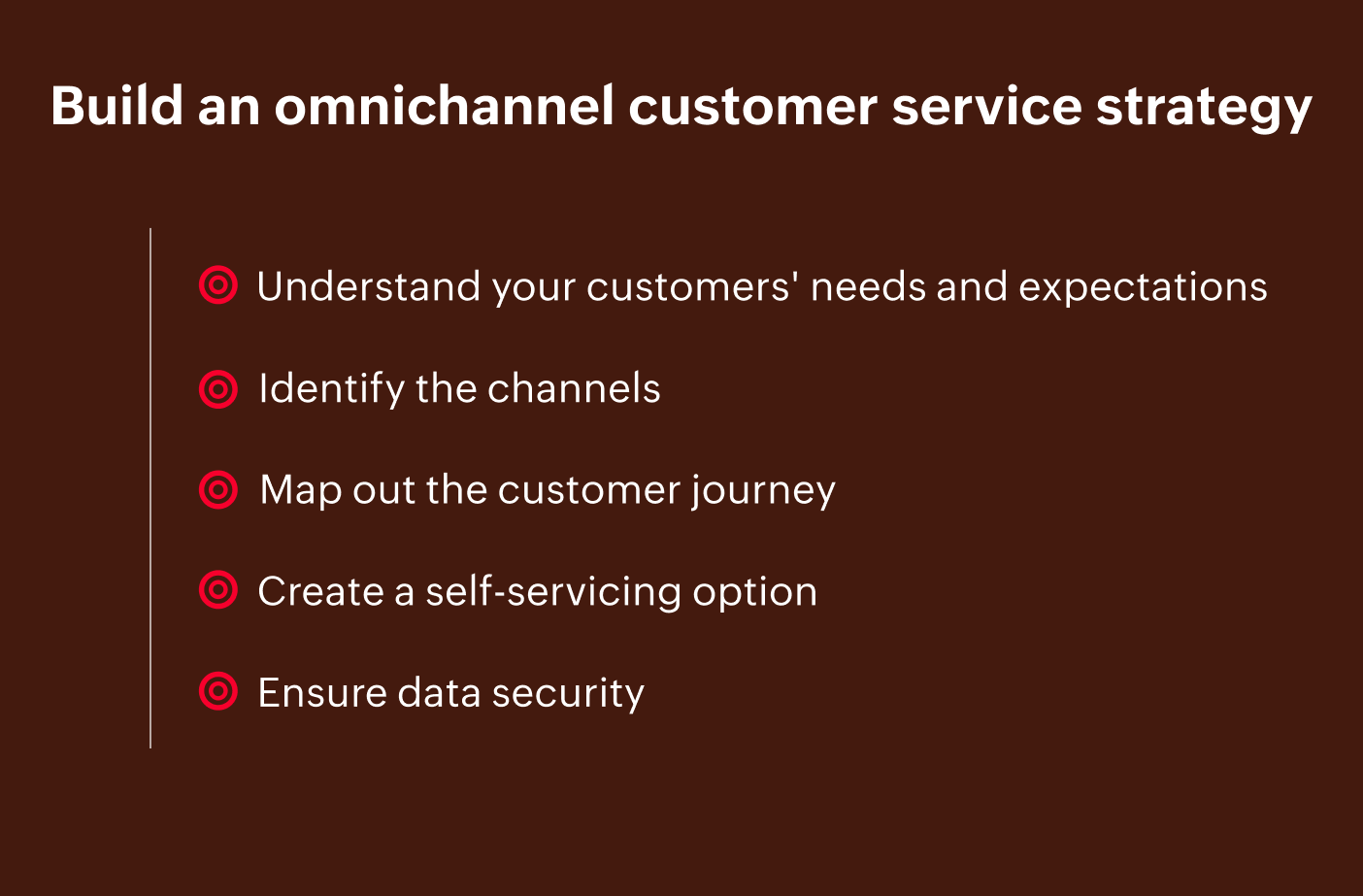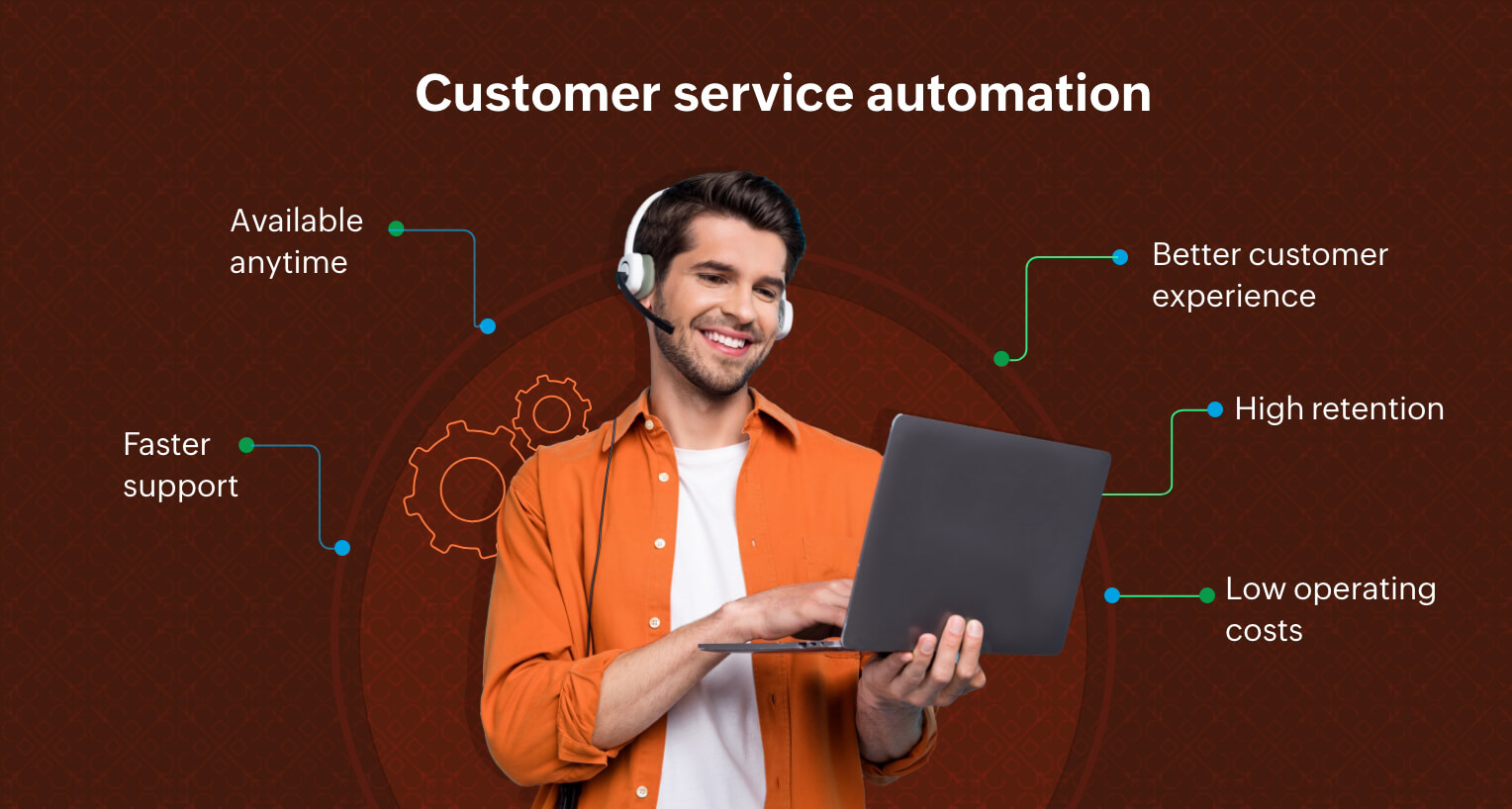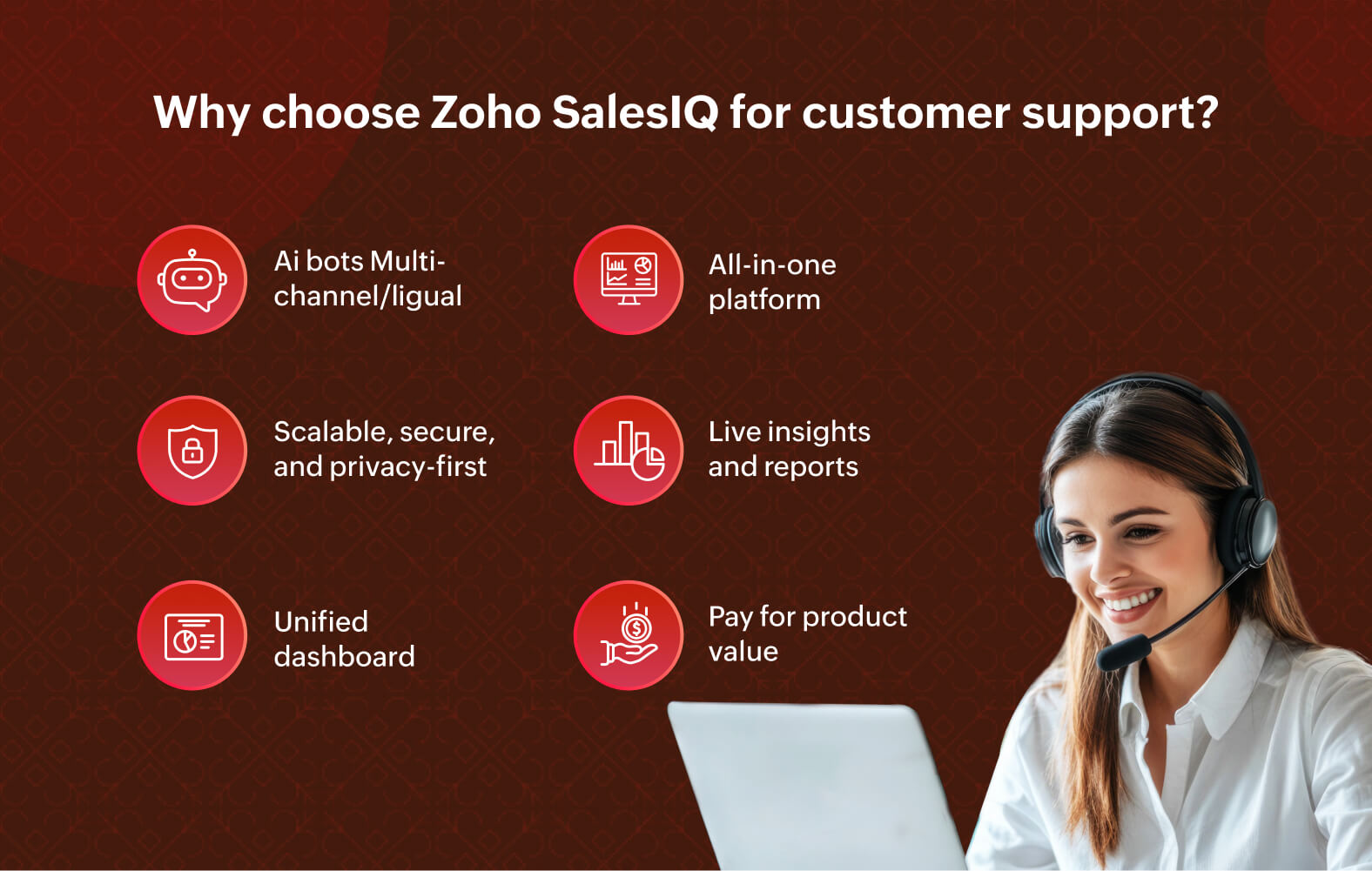What is omnichannel customer service?
Omnichannel customer service is to provide an unified experience consistently across all the touchpoints to your customers irrespective of the channels they get in touch with you such as phone, email, chat, social media, and others.
It's not just the channels and devices that make it omnichannel customer service. What truly defines it is the provision to integrate them so that the conversations can be moved seamlessly from one channel to another or one device to another without customers repeating themselves everywhere to get a resolution.
Omnichannel customer service is built so customers aren't restricted to fewer channels or specific devices. They can ask for support from their preferred channels/devices, and the businesses will be able to provide the requested information. But if customers prefer to switch channels/devices, businesses can continue the conversation without losing any context.
Why do businesses need omnichannel customer service?
Omnichannel customer service helps businesses offer a connected service experience to their customers irrespective of the platform/channels/device touchpoints they're on, which encourages the customers to prefer the business over others. Eventually, it leads to increased usage adoption, customer satisfaction, increased trust, loyalty, and LTV (Lifetime Value).
Customer communication channels are no longer restricted to just emails and calls. We now have SMS, email, video calls, and social network platforms. The devices aren't just restricted to landlines but advanced mobile phones, desktops, laptops, tablets, and the like.
As the role of customer service has grown beyond what it used to be and has become a distinguishable factor that customers look at when they buy, businesses don't have the luxury of picking one channel/device to engage with them. We've come to a juncture where customers are willing to compromise on some features if they get good support.
So, it's become important for businesses to be in all the places to provide customer service.
Difference between omnichannel and multichannel customer service
- AspectsOmnichannel customer serviceMultichannel customer service
- Channel setupAll the channels and devices will be integratedMultichannel will have a presence on multiple channels, but disjointed.
- Engagement experienceEnsures smooth, streamlined, and uninterrupted conversations, addressing of issues, and resolutions no matter what happensCommunication unification isn't possible. Because they aren't integrated, shifting the conversation from one channel/device to another is impossible.
- Data managementOmnichannel unifies customer communication data. It helps businesses get an overview of the customer's journey across channels and platforms.Customer communication data is found fragmented across channels and platforms.
Benefits of omnichannel customer service for businesses
Providing omnichannel customer service offers many benefits to both customers and businesses. Let's look at a few of these.
For customers
Convenience
Omnichannel customer service signals customers and prospects that your support is always available across multiple platforms. It offers them the flexibility and convenience to reach out through any medium without worrying about the best channel for quick assistance.
It allows seamless switching between devices and platforms. For example, you can start a conversation on Instagram via mobile and continue it through a remote session on a desktop. It ensures your customers receive prompt resolutions with minimal effort, which enhances their overall experience and confidence in doing business with you.
Instant response and faster resolution
Omnichannel customer service goes beyond mere convenience. Because of the connected channels and devices, it significantly enhances the likelihood of instant responses and faster resolutions. Without timely support, convenience alone wouldn't set your business apart. If timely support is consistently delivered, it adds real value and can become a decisive factor for customers in choosing your brand.
Better customer engagement experience
By making it easy for customers to reach out and ensuring instant resolution and faster support through omnichannel customer service, businesses can offer consistent engagement across various touchpoints, ultimately enhancing the overall customer experience. While contacting customer service may not be something customers prefer or enjoy, improving the quality of that interaction can make it more pleasant and memorable—or, at the very least, less frustrating.
Increased customer loyalty and retention
When businesses provide omnichannel customer service, it helps customers develop an affinity for your company and the service you offer. The affinity turns into loyalty, and they become your spokespeople in everything you do. Moving away from being your customers, they become loyalists, making them stay with you long, increasing your retention and customer lifetime value.
For businesses
Streamlined customer service and reduced operating cost
Omnichannel helps companies unify all their customer data and streamline service delivery. It gives them a complete overview of their support operations, removes roadblocks, and gives insights into what else they can do. Streamlining also helps lower their support operating costs over the years.
Multiple options to reach customers
Omnichannel customer service helps businesses deliver instant responses and faster resolutions, making the customer engagement experience convenient. It also gives businesses the advantage of having multiple options to reach out to customers when needed.
As business communication is moving away from email/phone communication, it opens up options for businesses to communicate via the channels the customers prefer.
Omnichannel customer service: Use cases and examples
Whatever domain you're in, whomever you cater to, having an omnichannel service elevates your customer engagement experience and help you earn their trust and loyalty for a long time. Still think it's not for you? Let us see some examples of how omnichannel presence changes the service scene.
B2B use cases and examples
Email is the customers' preferred mode of communication in B2B. Customer service can't be taken lightly, and specifically for B2B, it's crucial as your customers are answerable to their customers.
When customers face any issues and email your business, an email reply will suffice if the problem can be resolved. However, if something needs to be analyzed on the customers' end, email isn't the best route to resolution.
Instead, the customer instantly initiates a chat. Because it's omnichannel, the email and chat conversations are synced up, so the business can instantly initiate a screen sharing/remote access session to check the issue and provide a resolution.
B2C use cases and examples
B2Cs prefer SM/IM channels more than traditional communication channels such as WhatsApp, Instagram, Telegram, and more. Customers don't have to hop to a specific channel/platform to reach out. They can initiate their conversation on Instagram while browsing and carry on the conversation in WhatsApp or any of their preferred communication channels.
How to build an omnichannel customer service strategy
Let's look at some tips on how businesses should plan their omnichannel customer service strategy.
Understand your customers' needs and expectations
- Evaluate your current customer service setup.
- Assess your customers' needs and expectations.
- Identify if customers use multiple channels or devices when they come for queries.
Identify the channels
- If there's a need, choose the channels where your customers/prospects already are.
- Avoid adding channels irrelevant to the target audience (e.g., don’t include Line if you don't have any customers from Japan).
Map out the customer journey
- Identify how customers move through your offerings and track their channels' journey.
- Pinpoint customer support touchpoints along the journey.
- Once mapped, figure out when and where to deploy omnichannel support.
- Ensure customer support is available at critical moments across channels.
Create a self-servicing option
- Integrate self-service tools with omnichannel support.
- Provide resources like articles, knowledge bases, and guides.
- Use FAQ chatbots to help customers quickly find answers.
- Enable customers to resolve issues independently for faster support.
Ensure data security
- Ensure data security in your omnichannel customer service strategy.
- Protect customer data across all integrated channels and devices.
- Choose a reliable tool to simplify omnichannel implementation.
- Use trusted solutions to manage security and support efficiently.
Improve customer service across channels with Zoho SalesIQ
Zoho SalesIQ is the best tool for providing customer service via all your existing channels.
With its direct integration with Zoho Desk and Zendesk , built-in audio call, and integration with all the major social channels such as WhatsApp, Instagram, Facebook Messenger, Telegram, WeChat, and Line, it's the only platform you need to provide the best support experience to your customers.
Want to see it in action? Sign up now for free—no credit card is needed.
Related resources
Here are some blogs to help you learn about the other facets of omnichannel and multichannel.
FAQs about omnichannel customer service
What channels are supported in an omnichannel system?
Omnichannel supports multiple communication mediums, from traditional means such as emails and text messaging to modern live chat solutions. The live chat offerings will include social media platforms like Facebook and Instagram and instant messaging channels like WhatsApp, Telegram, and more.
Is my data safe across all these channels?
Since omnichannel involves multiple channels, each channel comes with its own challenges in keeping the data safe while integrating. That's why it's crucial to select a platform like Zoho SalesIQ as we're known for our privacy standards.
Related read: SalesIQ's AI for secured conversations
Can I start a conversation on one channel and continue on another?
Yes, it's possible, as that's what omnichannel communication means. For example, suppose someone initiates a conversation on live chat from your website. In that case, they'll also be able to continue the conversation from where they've left off on your WhatsApp business channel. Customers and businesses will have context on all the integrated platforms to continue the conversation.
How does omnichannel support improve the customer experience?
As omnichannel interlinks all the channels together, businesses will be able to provide uniform engagement across all the customer touchpoints. It enhances customers' convenience by providing instant response and faster resolution, ultimately improving their engagement experience.







